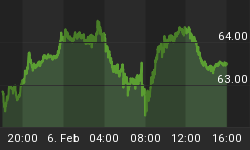To compute "Real GDP" one has to adjust nominal GDP by a measure of inflation. Different measures of inflation provide different answers.
Doug Short at Advisor Perspectives has an excellent column following every GDP release showing what the reported GDP would look like with various deflators.
His latest report is Will the "Real" GDP Please Stand Up? (The Deflator Makes Big a Difference)
How do you get from Nominal GDP to Real GDP? You subtract inflation. The Bureau of Economic Analysis (BEA) uses its own GDP deflator for this purpose, which is somewhat different from the BEA's deflator for Personal Consumption Expenditures and quite a bit different from the better-known Bureau of Labor Statistics' inflation gauge, the Consumer Price Index.
The Lower the Deflator, the Higher the GDP
The BEA puts the latest compounded annual percentage change in the GDP deflator (i.e., the inflation rate) at 0.60%.
Interestingly enough, the Briefing.com consensus forecast was for the deflator to come in at 1.6%. Had the deflator indeed come in at the Briefing.com consensus of 1.6%, Real GDP would have been a percent lower at -1.13%. Had the deflator indeed remained unchanged from the previous quarter, today's Q4 real GDP would be two percent lower at -2.21%.
Question of the Day
Let's stop right there and ask: Does anyone out there possibly believe price inflation is a mere .60%?
- With the GDP deflator (the official measure), the reported GDP was -.14%
- Using PCE (personal consumption expenditures) as a deflator, GDP would have been -.77%
- Using CPI (the consumer price index) as a deflator, GDP would have been -1.56%
- Using ShadowStats CPI as a deflator, GDP would have been -4.3%
Here are a few charts courtesy of Doug Short.
Real GDP with GDP Deflator
Real GDP with CPI Deflator
Wednesday evening I asked Doug Short for a chart using HPI-CPI as a deflator. It's a chart he normally does not produce but did so this time because we had the data.
Real GDP with HPI-CPI Deflator
HPI-CPI Discussion
For background and an explanation of the HPI-CPI please see Dissecting the Fed-Sponsored Housing Bubble; HPI-CPI Revisited; Real Housing Prices; Price Inflation Higher than Fed Admits
Using HPI-CPI as a deflator it hardly appears there was a recession in 2001 at all.
It's debatable which of the three charts best describes reality. However, I vote for the third believing that houses are consumed, even if very slowly (although the land on which the house sits is not). The current assumption is houses are a capital expenditure and people rent housing from themselves at an implied OER - Owners' Equivalent Rate (see preceding link for discussion).
Regardless, the current deflator of .60% is simply not believable, meaning GDP is overstated.
Regression Trends Show Lower GDP Growth Over Time
Notice the linear regression trendlines in the first and third charts. The middle chart would have looked similar if it had such a trendline.
Clearly the trend is toward lower and lower GDP readings. And I expect this trend to continue, likely accelerate to the downside.
Inquiring minds may be asking "Why?"
Ten Reasons for Declining GDP Growth
- Changing social attitudes towards consumption and debt in all age groups
- Demographics of an aging workforce
- A severe lack of high-paying jobs for college graduates
- Kids fresh out of college have delayed marriage, family formation, and home purchases
- Many coming out of college are effectively debt slaves having no way to pay back student loans
- Debt overhang from the housing bust
- Boomers headed into retirement have insufficient savings
- Shrinking middle-class plagued by declining real wages
- Rapidly changing technology negates skills
- Technology, especially robots, currently eliminates more jobs than it creates


















